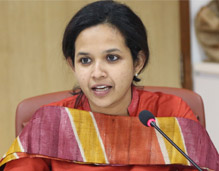Sino-US Disorder: Power and Policy in Post-COVID Indo-Pacific
Associate Fellow, Manohar Parrikar IDSA, Dr. Titli Basu’s article 'Sino-US Disorder: Power and Policy in Post-COVID Indo-Pacific' has been published in Journal of Asian Economic Integration 2(2) 159–179, 2020.
Great powers have invested in order-building projects with competing visions of political values and ideologies. How the Coronavirus (COVID-19) pandemic shapes the balance of power and order are debated. The pandemic will reorganise the international system and power structures. Situating the Indo-Pacific project in this backdrop, this article critically analyses the debates, discourses and nuanced divergences that are shaping the Indo-Pacific puzzle in the power corridors of Washington, Tokyo and Delhi, in addition to mapping Beijing’s approach to Indo-Pacific. With new realities in play, the India-US-Japan triangle will feature as one of the key building blocks of Indo-Pacific to deliver on the shared responsibility of providing global public goods.
- Published: 1 September, 2020











